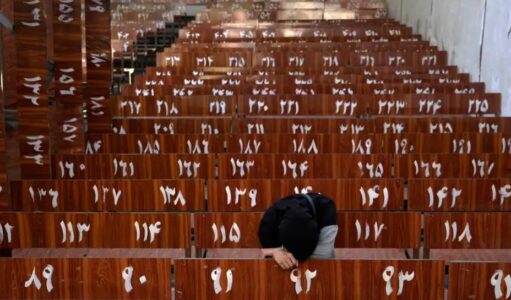
Afghan protests continue against school attack as UN raises death toll to 53
Female students in Afghanistan took to the streets for a third day in a row Monday to seek justice for victims of last week’s suicide bombing of an education center in Kabul, as the death toll continues to rise.
The U.N. Assistance Mission in Afghanistan (UNAMA) said Friday’s powerful blast in the capital, Kabul, had killed at least 53 people, including 46 girls and women, and wounded more than 110 others.
“Girls and young women [were] the main victims. Casualty figures likely to rise further,” the UNAMA tweeted Monday. “Our human rights team continues documenting the crime: verifying facts & establishing reliable data to counter denial & revisionism.”
The attack targeted the private Kaaj tutoring center in Dasht-e-Barchi, a western Kabul neighborhood home to the Afghan minority Shia Hazara community.
Survivors said there were 400 boys and girls, separated by a curtain, in line with Taliban instructions, taking a mock university entrance exam when the bomber detonated his explosives in the girls’ section.
The Islamist Taliban government has come under severe criticism for failing to provide security to what rights groups see as the most persecuted Afghan minority group. The violence has sparked domestic and international outrage, prompting Afghan female students in several cities to stage protests.
On Monday, dozens of university students marched through the streets of Mazar-e-Sharif, the capital of the northern Balkh province, demanding justice for the victims.
Taliban security forces allegedly locked a group of women students in their dormitory to prevent them from joining the rally, according to social media videos. VOA could not verify the authenticity of the footage showing a girl trying to unsuccessfully break the door lock with a brick.
Kabul, western Herat, and central Bamiyan are among the cities where demonstrations have been held since Friday by mostly Hazara women students. Protesters also have pressed the Taliban to ease restrictions on women’s rights to work and education, while others have expressed support for ongoing protests in neighboring Iran.
Taliban security forces have disrupted protests by firing in the air, but some have accused them of beating or firing at demonstrators.
The Taliban have barred grades seven through 12 from resuming secondary schools in most of the country since they seized power a year ago. The Islamist group also backtracked on promises to open all Afghan schools in March.
However, the Taliban have opened public and private universities to women students across Afghanistan, with strictly segregated classrooms for male and females.
No one has claimed responsibility for Friday’s blast in Kabul, which critics see a setback to women seeking education in defiance of strict Taliban polices.
“Our last hope was educational institutions. Unfortunately, now the institutions are also under threat,” said Sakina Nazari, a 25-year-old resident and former Kaaj student whose family friend was badly injured in the attack.
Private tutoring centers have provided a lifeline to girls wanting to further their education and a chance to go to universities, where women are still allowed, though they face increased restrictions and growing economic challenges.
The UNAMA has called on the Taliban to bring to justice those responsible, urging the Islamist rulers to “fulfil obligations to ensure safety of all Afghans.” The United States, Pakistan and other countries have also denounced the violence.
The Taliban have vowed to enhance security of all Afghans following the attack and have sent their representatives to Hazara victim families in a bid to reassure them of protection against possible future attacks.
The Taliban foreign ministry in a statement has condemned Friday’s attack and other such incidents as the work of “malicious networks” and “a conspiracy by the enemies” of Afghanistan to create divisions among the Afghan people.
“The Islamic Emirate does not believe in any ethnic or religious division of the Afghan people and considers itself responsible for protecting the lives of all Afghans,” the ministry said.
“While pledging to all our compatriots that we will do more to identify and bring to justice perpetrators of these attacks, we urge all foreign parties to refrain from issuing irresponsible statements on Afghanistan’s internal affairs beyond expressing condolences.”
Previous attacks against Afghanistan’s Hazara community have been claimed by the local offshoot of the self-proclaimed, Sunni-based, Islamic State group, known as Islamic State Khorasan or ISIS-K.
The terrorist outfit has stepped up its extremist violence since the Taliban returned to power in August 2021 when all U.S.-led foreign troops withdrew from Afghanistan after almost 20 years of war.
Source: Voa News





